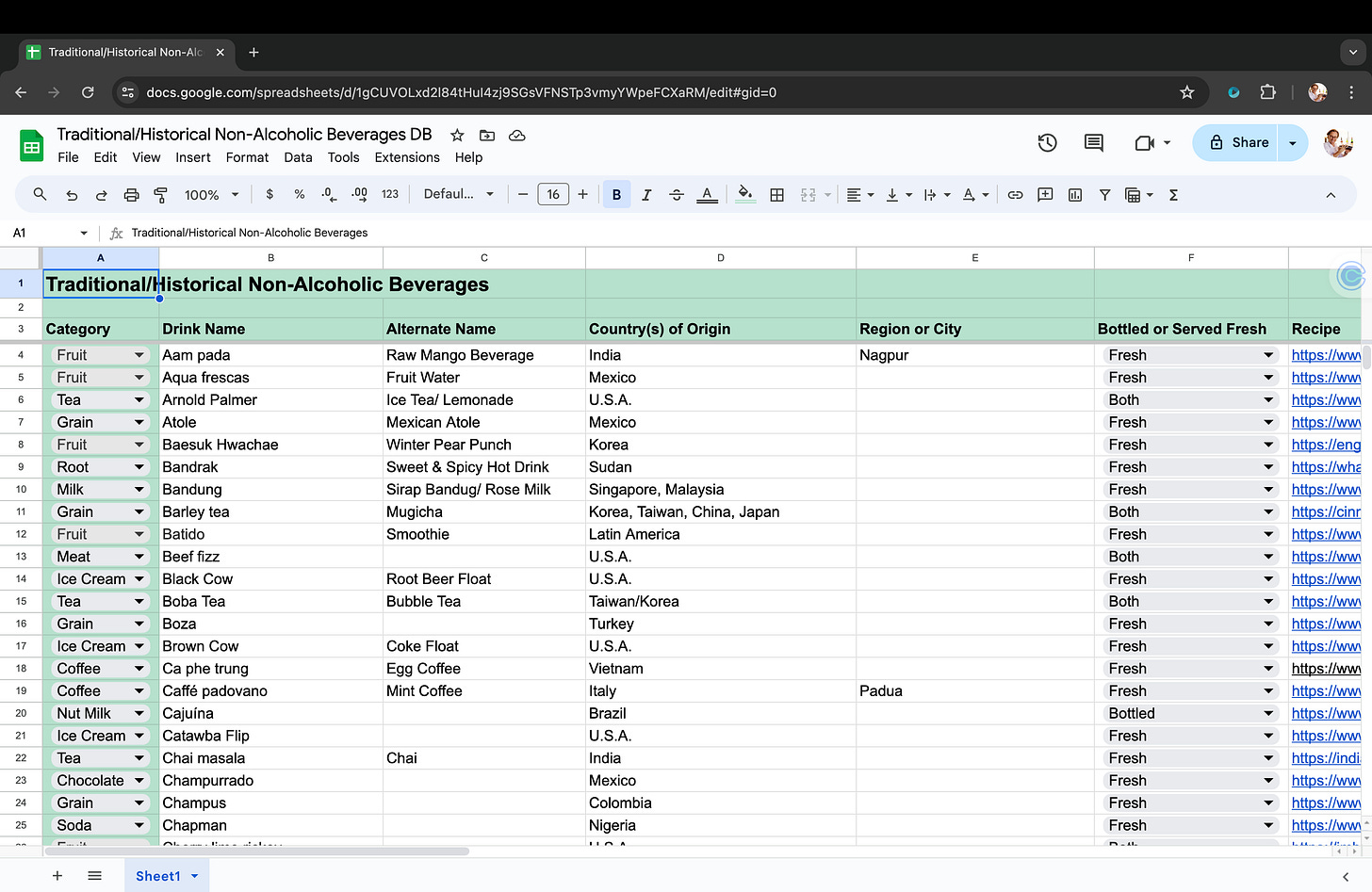100 Non-Alcoholic Drinks That Have Nothing to Do With Non-Alcoholic Wine, Spirits, or Beer
Though wine, spirits, and beer analogs provide a handy alternative, sometimes you want something completely different.

As we sat for breakfast during the San Francisco World Spirits competition, my friend and fellow judge Scott Baird––veteran bartender, chef, and spirits expert––leaned in and asked one question that many other bartenders and consumers often wonder but rarely say out loud:
“Why?”
Why bother to recreate non-alcoholic analog or proxy versions of drinks with alcohol when you can either borrow from the many non-alcoholic traditions throughout the world or create something new? Even Ben Branson, founder of Seedlip, has recently decried new brands imitating alcohol categories.
Try as I may, over a cup of coffee and bowl of granola, I don’t think I convinced him.
For alcohol drinkers, we want what we’ve lost. If you usually drink Old Fashioneds but, for whatever reason, aren’t drinking that night. You might want your drink to taste just like––or as close as possible to––an Old Fashioned. It’s why Impossible Burgers, nut milks, and gluten-free muffins exist. These simulacrums are meant to replace the experience we’ve lost. Though they often lack the principal ingredient that defines the original, they possess a certain similitude.
Sometimes it works, sometimes it doesn’t.
On the other hand, we want something authentic, a word often overused but still meaningful. We could use the word provenance, too. Something that is “authentic” has a provenance, it comes from somewhere. It possesses a certain somewhere-ness, or may even be part of traditional or cultural practices.

Whether you prize the similitude or somewhere-ness depends a bit on your own purposes. For someone looking to replace a nightly ritual, it makes sense to substitute one-for-one, which is why I see more consumers endorsing the analog or proxy beverages. For someone whose purpose is to create novel or authentic culinary experiences, then it may make more sense to take your influences from elsewhere.
Either way, I appreciate both. And I think that Baird, as a culinary innovator, has a right to eschew drinks that are merely copies of the original. Just as much as someone making their nightly Old Fashioned has a right to sub Spiritless Kentucky 74 for whiskey. Both serve a purpose.
However, in praise of the Bairdian approach, I’ve assembled a list of 100 drinks from throughout the world and history that have absolutely nothing to do with non-alcoholic beer, wine, or spirits.
These include drinks made with fruit, vegetables, nuts, roots, tea, coffee, chocolate, grape must, herbs, flowers, tisanes, milk, ice cream, phosphates, and more. But not alcohol (though some may have a small percentage of alcohol or can be made with alcohol).

My criteria for acceptance to the list is that it must have three or more ingredients (sometimes base ingredients plus sugar and water), should be recognizable as a mixed drink (versus coffee or tea by itself), exhibit some level of complexity, be delicious on its own, but also provide some “genetic material” for experimentation. In other words, it should be something delicious, complex, mixed, and mixable.
I definitely allowed a few pre-mixed sodas onto the list because they’re great non-alcoholic drinks. I may switch that out; it’s an evolving project.
Far from being an exhaustive database, this is my personal research. But I’m sharing it with you because I could use your help. I chose these drinks because I have some familiarity with them. Some I have made before or used in cocktails. But that familiarity is to varying degrees. If you’re familiar with the drink and would like to add any comments about how you make it or other similar drinks, please feel free to leave a comment below. Even if I augment or change the recipe, I like to make sure I understand, as best as possible, the intent and give credit to its authors.
Also, if you think I missed a non-alcoholic drink that fits the bill, tell me.
Traditional & Historical Non-Alcoholic Drinks Database
And, of course, if you have to ask why I’m doing all of this, I refer you back to my friend, Scott Baird. “Why?” is always a good question, but I think an equally excellent question is, “How?”
Derek Brown is an author, award-winning bartender, NASM-certified wellness coach, and founder of Positive Damage, Inc.
This newsletter is free and public. Share with anyone you think will enjoy it.





A separate comment: I dont see vinegar based shrubs on the list? And dry-hopped infusions , esp. hop water (they are very different than alc free beer! unforntunaely in german, but you can translate: https://www.hopstore.fr/de/houblonner-au-lieu-de-fermenter-lavenir-des-boissons-sans-alcool-au-travers-du-houblon/
This is great!
to replace beer or wine, my very personal criteria would be
a) dry (i.e. non-sweet, we have a german word "herb" for it - what a beer or wine is) -> exclude milk- or juice-based drinks, etc. but also water
b) entirely caffein free -> often excludes kombucha
c) cold , ideally refreshing (sparkling) -> excludes tea, etc.
So far, only alc-free alternatives do that (better or worse), e.g. alc-free beer.
Some vinegar-based shrubs go in the direction, but often they remain quite sweet.
I wonder if you have any suggestions from your list?